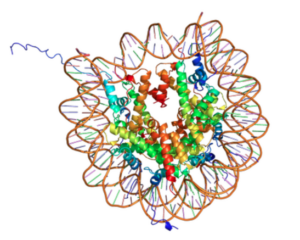Introduction to Epigenetics: More Than Just Genes
Our genetic makeup is like a vast bookshelf, with each gene representing a unique volume. Epigenetics is the study of the ‘highlighters’ and ‘bookmarks’ that dictate which volumes get read and which don’t, affecting our traits without altering the DNA text itself. This intricate interplay of genetics, nutrition, and environment shapes everything from our health to our behavior.
Epigenetics is the unsung story of our biological narrative, where the Greek prefix “epi-“—meaning “on top of” or “in addition to”—guides the expression and function of our genes. This field is a fascinating crossroads of genetics, environment, and lifestyle, revealing how factors like nutrition, stress, and sleep influence the script of our genetic makeup.
The Human Genome: A Library of Potential
Consider our DNA as a vast library, and each gene a book brimming with potential narratives. In the realm of epigenetics, modifications act as highlighters, emphasizing certain genetic texts while silencing others. This selective highlighting dictates our cells’ fate, influencing which traits are expressed—all without altering the DNA sequence itself. Just as a highlighter emphasizes key passages in a book, epigenetic marks accentuate certain genes for activation or repression. These marks do not change the underlying genetic code but influence which genes are expressed and to what degree.
Mechanisms of Epigenetic Control: Methylation and Beyond
Epigenetic changes, while natural and necessary for cellular differentiation, can also lead to adverse health effects. DNA methylation and histone modification are two principal ways these changes occur, controlling the ‘on’ or ‘off’ states of genes and playing a significant role in our development and health. These mechanisms are vital for steering a cell’s destiny, such as its maturation into a neuron or a liver cell. Yet, when these processes go awry, they can lead to profound health consequences, including the emergence of cancer.

DNA and Histone | University of Leicester
The Impact of Lifestyle and Environment on Epigenetics
Our daily lifestyle choices—what we eat, how much we exercise, the stress we endure, and the quality of our sleep—all have tangible effects on our epigenetic marks. These tiny chemical compounds and proteins that attach to our DNA act as meticulous scribes, continually rewriting how our genes are expressed. This constant editing can lead to a myriad of outcomes, from glowing health to complex diseases. By understanding these epigenetic influences, we can potentially harness them to improve our wellbeing and prevent illness.
Transgenerational Epigenetic Inheritance: Legacy Beyond DNA
The story of our lives, written in the language of epigenetics, may not end with us. There is compelling evidence to suggest that the epigenetic ‘notes’ we accumulate—shaped by our diet, our environment, our triumphs and traumas—could be passed down to future generations. This remarkable aspect of inheritance opens up profound questions about the lasting legacy of our lifestyle choices and their potential to influence the health and traits of our descendants.
Reversing the Epigenetic Clock: Emerging Research
The hands of the epigenetic clock may not be as unyielding as once thought. Innovative research into age-related epigenetic changes reveals that it might be possible to turn back time at a molecular level. The cyclic expression of Yamanaka reprogramming factors, for instance, has shown that age-related epigenetic marks might not be permanent after all. These findings light the way to potentially revolutionary therapies that could redefine the human aging process.
Epigenetics in Action: Understanding Your Genetic Blueprint
By integrating the science of genetics and epigenetics, we are now able to peer into our own genetic blueprints and discern how our lifestyles influence our genes at an epigenetic level. This incredible fusion of information and technology offers personalized insights, allowing us to craft a lifestyle that harmonizes with our genetic predispositions to foster optimal health. Using the science of genetics and epigenetics with a unique interpretation engine Fitgenetix enables you to understand your genetic blueprint then be able to see how your day-to-day diet, exercise, sleep and environment are affecting them at an epigenetic and cellular level.
The Future of Epigenetic Research
As we chart the course of epigenetic research, initiatives like the International Human Epigenomics Consortium are at the vanguard, mapping out the epigenetic modifications across various human cells. This endeavor is not merely academic—it carries the promise of unraveling the complex ties between our genes and the myriad of human conditions, potentially transforming the landscape of medical science.
Navigating the Epigenetic Landscape with Caution
In the excitement of these scientific advancements, we must tread carefully, wielding skepticism as a tool to discern fact from hopeful conjecture. The extrapolation of animal study findings to human health is a path fraught with complexity, reminding us of the meticulous nature required in scientific exploration and interpretation.
Conclusion: The Personal Impact of Epigenetics
As we wrap up our epigenetic journey, it becomes clear that this science is deeply personal, resonating with the everyday choices we make. It is a testament to the power of our actions and environment over our genetic expression, and a clarion call to mindful living, as the echoes of our choices today may resonate through generations to come.
Navigating the Epigenetic Landscape with Caution
With the promise of epigenetics comes the need for careful interpretation. This cautionary note would emphasize the importance of scientific skepticism and the complexities of applying animal model findings to human health.
Conclusion: The Personal Impact of Epigenetics
In closing, we would reflect on how the science of epigenetics brings a deeper understanding of how our environments, lifestyles, and choices continuously interact with our genetics to shape our current and future health.
Understanding your unique genetic blueprint through the lens of epigenetics opens a window into how daily lifestyle choices impact your genes at a cellular level, offering insights that were once thought to be in the realm of science fiction.


